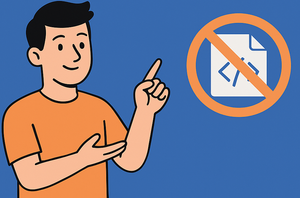There’s a strange ritual in the tech industry that plays out like clockwork: A shiny new tool or platform drops, promising to “democratize” development or eliminate the need for engineers altogether. Headlines go wild. Startups pivot. Investors salivate. And developers—quietly, persistently—keep building.
We’ve seen this cycle repeat with NoCode platforms, with drag-and-drop website builders, with AI code generators, and with every new abstraction layer from the cloud to serverless. The narrative is seductive: “Anyone can build apps now. Who needs developers?”
But here’s the thing: Every time we’re told developers are about to be replaced… they just get more essential.
The Fantasy: Push Button, Build App
The idea that building software can become fully automated is appealing. It promises to lower costs, move faster, and sidestep the so-called “bottleneck” of developers. Whether it’s a VC pitch deck or a product marketing site, the message is the same: “This platform empowers anyone to build apps in minutes.”
Reality check: Most of these tools trade complexity for constraints. You can build simple apps quickly, sure—but try building anything nuanced, scalable, or integrated with real systems, and you’ll hit a wall fast.
That’s when the developer gets the call. “Hey, can you just add a custom API to this NoCode app and make sure it talks to our legacy CRM?” Welcome back.
The Truth: Abstractions Shift, But Problems Stay
Tools evolve. The job evolves. But the core challenges of software remain:
- Understanding user needs (even when they don’t know how to articulate them).
- Designing scalable systems that won’t collapse after 100 users.
- Writing clean, maintainable code that someone else can understand six months from now.
- Navigating trade-offs between speed, cost, and reliability.
You can abstract away syntax. You can wrap business logic in a slick UI. But you can’t abstract away complexity. Someone still needs to design the system, map the architecture, and debug the edge cases.
Every Revolution Becomes a Job Description
Ironically, every wave of “developer replacement” has just created more roles for developers:
- NoCode and LowCode didn’t eliminate coding—they created demand for developers who can extend these platforms and build the stuff they can’t handle.
- Cloud platforms didn’t remove infrastructure—they birthed DevOps, SREs, and a whole ecosystem of infrastructure-as-code.
- AI code assistants don’t replace you—they make you faster, but only if you already know what you’re doing.
New tools mean new responsibilities. Developers don’t disappear—they level up.
What Actually Makes Developers Valuable
It's not your ability to write Python or JavaScript. It’s your ability to think clearly, solve ambiguous problems, and ship working systems. Those skills transcend languages, platforms, and trends.
The tools will keep changing. Your value is your brain.
This is especially true as automation becomes more common. Low-code and AI aren’t threats—they’re leverage. They let you focus on the higher-value stuff: workflows, UX, architecture, and business outcomes.
And if you're building on the edge—automation, AI integration, systems design—your role isn’t vanishing. It's just evolving. And if you're smart about it, it’s evolving into something more strategic, more impactful, and more fun.
So… Should You Be Worried?
Only if you stop learning.
The developers who fall behind aren’t the ones replaced by AI—they’re the ones who cling to one tool, one way of thinking. But if you embrace new tools, stay curious, and learn how to solve real problems with whatever’s in your toolkit… you’re golden.
TL;DR: The next time you hear that developers are obsolete, take a breath. Then keep building. Because software doesn’t write itself, and complexity isn’t going away. But you? You’re just getting started.


